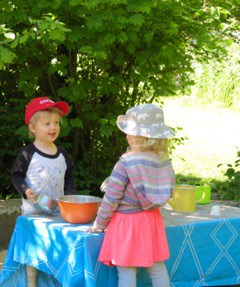If there were ever two words I’ve started to dread almost more than all others it’s, “Let’s pretend…” Which is invariably followed by the same recurring scenario (as dictated by my eldest): “I’ll be the baby and you can be the mommy and then I’ll be sick and you can be a doctor and then, and then and then,” it goes on.
At first, I blamed Disney princesses. And then the cute stuffies at the tea party. But when the sight of a toy stethoscope at the teddy bear hospital set me off, it was time for help and a change of attitude.
Pretend play (or dramatic play) is, without a doubt, my eldest’s go-to kind of play, and despite it sometimes being a source of frustration for the many parents co-opted into being playmates, the research is stacked very high in favour of its incredible benefits.
Tapping into our imagination is our greatest gift, said Emma Jayne Bjormark, founder of Fresh Ayre Daycare. It’s something we start to do even before 18 months old.
“You’ll see little ones start to imitate things you do. Like picking up a block or banana and pretending it’s a phone,” she explained.
And although the repetitiveness of pretend play can sometimes feel exasperating for parents, there’s a lot of learning going on beneath the surface.
“Children are acting out their world to figure out how to make sense of it,” she said. “There’s language, mathematical development, social development, representational skills of their world around them and negotiation in play. They’re figuring out power dynamics and empathy, and what it means to respect others, as well as objects and belongings. It’s also an opportunity to explore and cultivate natural curiosities.”
Emotional understanding, too, forms a large part of pretend play, she explained. It can be used sometimes as a gentle means to work through tricky, real-life scenarios.
“There are so many feelings and emotions for young children and they can often act out physically,” she said. “But you can use dramatic play to learn those lessons in a not-so-strict and obvious way.”
It can even help children become more comfortable with unfamiliar surroundings, she explained.
“Children often play by themselves to figure out their world before they start building connections with peers. So, in the early days of dramatic play at home, it’s important for parents to sit down and be that person and model how to be in a relationship, and what friendship is.”
For parents recruited as playmates, be present and really listen while you’re playing.
“I can’t emphasize that enough,” explained Bjormark. “We really need to be present and get excited about what they’re doing. They want you to play with them.”
Though time is often in short supply, Bjormark believes we can all make five minutes to put down the phone and be in the moment.
“It’s not easy, but if you engage in the play, it helps set them up for success to continue that play while you step out,” she said.
Though we should never put an end to imagination play, said Bjormark, setting up time limits or expectations is OK.
“For example, ‘Mom’s going to be the mommy in your game for 15 minutes and when the timer goes off I have to make dinner. You can help me if you want or you can keep playing this game.’”
At that point, you could then reach for a tub of lentils, a bundle of scarves or a basket of Tupperware while saying, “‘Do you want to play with this while mom makes dinner?’ It’s continuing her dramatic play while you’re still getting time to do your own thing.”
For some, scheduling pretend play into the day might be easiest. For others, it could be about going with the flow. But even just five minutes really can make a difference, she explained, because once they’ve had your undivided attention they’re less likely to act up later.
Pretend play also offers children a rare opportunity to be in charge, so don’t pass judgement on what or how they choose to play, she advised.
“Typically, we want the control as adults and it’s a hard skill to bite your tongue and just listen…but give them the opportunity to be heard and try to get lost in it.”
If you find yourself getting frustrated within the play, recognize that you’re no longer being present and try to jolt yourself back in, she suggested. Perhaps start a conversation about changing roles, she said, or taking the play outside.
Finally, said Bjorkman, it’s time we relaxed about whether or not we’re doing everything we can for our kids in the early years. “Pretend play, I think, encapsulates everything… and it helps build stronger, authentic connections with your kids. Give them time, it’s all they really want.”




